Posts Tagged ‘office communication’
It’s been almost two years that we’ve been looking into people’s homes on Zoom. Life and work have changed, and people have a variety of feelings about those changes. Some people miss working in person and can’t wait to go back to the office. Some people love working from home and never want to go back. What’s important is the ability to talk about how we feel and what we need from work – with the people we work for.
Most people suffer in silence, concerned to ask for what they want or need at work. Managers find out their employees are unhappy when they come across employees’ resumes on the internet.
The world has changed and how we interact needs to change to. Your manager may not be able to allow you to work from home all the time, but she certainly won’t if you don’t tell her what you want.
We need to cross the line, having conversations that perhaps we haven’t had in the past.
Managers, in addition to checking in on work progress, talk about how employees are doing and what they need going forward to be satisfied and do their best work.
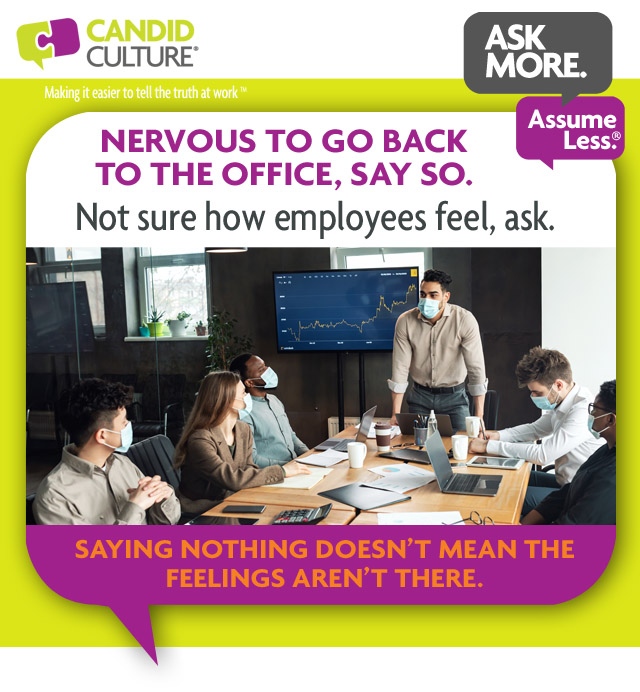
Questions to ask during regular check-ins:
I’m not a fan of asking, “How are you doing?” It’s a vague question, and vague questions produce vague answers. But many employees will go their whole career without being asked how they’re doing. It demonstrates caring. It’s a place to start.
Here are some better questions to ask employees:
- What’s changed for you in the last 18 months?
- What have you learned about yourself in the last 18 months?
- What has changed about what you need from work, if anything, in the last 18 months?
- What would you tell me if you weren’t concerned about how I would react?
Managers, even if you ask these questions, employees may not feel comfortable answering. Managers can lead by example by talking about themselves. Share how your life, needs, and desires have changed. Share your own constraints. When managers show vulnerability, they convey it’s ok for employees to do so as well.
Also, tell employees that you really want to know the answers to the questions and assure employees there won’t be negative consequences for speaking candidly. Projects won’t be taken away. Careers won’t be impacted. You’re just talking. If employees never want to come into the office or travel, or want to work part-time, yes, jobs and careers may be impacted. But a conversation is just that, a conversation.
You won’t get what you don’t ask for.

Perhaps you’re going back to work in person part or full time and you’re nervous. Will people sit closer than you’re comfortable sitting? Will people wear masks? Will someone ask you to wear a mask when you don’t think it’s necessary? Yes, yes, and yes. All of these things are likely to happen. And addressing each situation will be uncomfortable. The good news is, if all of these events are predictable, they’re also preventable.
The time to talk about how people will behave in the office, is before people return to the office. Preventing a breakdown is always easier than addressing one.
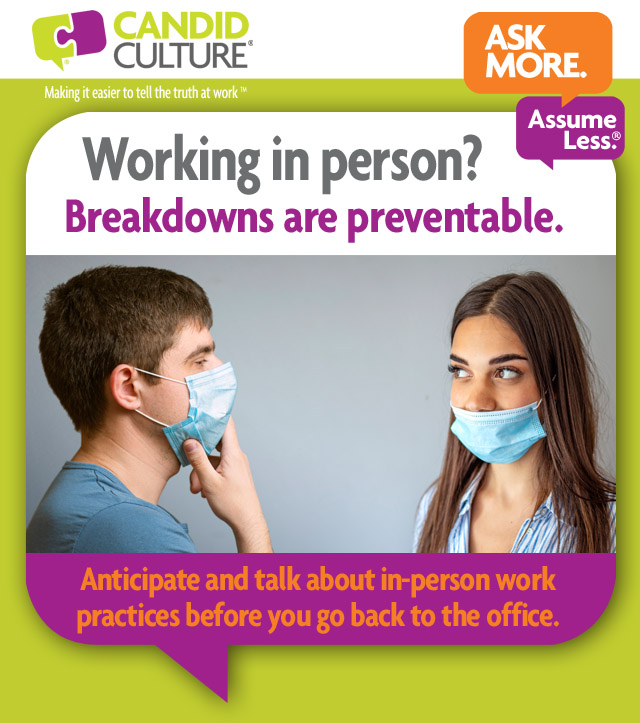
Managers, get your team members together via phone or video and outline the organization’s expectations around masks, physical distancing, etc. Be explicitly clear. “Everyone is expected to be courteous and use common sense.” is not clear. My definition of being courteous and using common sense is different from yours. Follow the meeting up with written expectations that reiterate what you outlined during the meeting.
Direct reports, speak candidly with your managers about what you need. If you’re not comfortable working in an open floor plan, talk about it before you go back to the office. If you’re not comfortable attending a meeting with others in a conference room, have the conversation before the first in-person meeting. It’s ok to have concerns, and it’s ok to talk about them.
Teams, get together via phone or video before you go back to the office and agree on the practices you will follow. For example, if your organization’s policy is to wear a mask and a team member’s mask is below their nose, everyone on the team has the right to ask the person to pull it up. If a team member feels people are sitting too close, it’s ok to ask for space.
My point isn’t which Covid safety practices to employ. My point is to have the conversations before you return to the office. Anticipate every possible outcome. Talk with friends and colleagues who are already working in person and ask for the pitfalls and breakdowns they’ve experienced. Set clear expectations with your manager, peers, and internal and external customers. Then agree to talk about breakdowns as they happen. If you can predict it, you can prevent it.
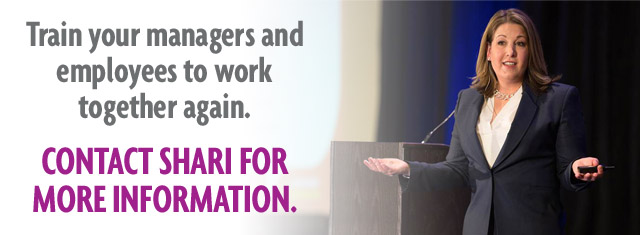
 You’ve heard countless times that you never get a second chance to make a first impression. So when something not-so-positive happens – a customer is upset, you missed a deadline, or made an error – don’t let your boss find out about it from someone else. Manage your professional reputation and get there first to create the first impression of what happened.
You’ve heard countless times that you never get a second chance to make a first impression. So when something not-so-positive happens – a customer is upset, you missed a deadline, or made an error – don’t let your boss find out about it from someone else. Manage your professional reputation and get there first to create the first impression of what happened.
Managers don’t like surprises. If your manager is going to get a call about something that isn’t positive, let her know before the call comes in. You will create her perception of the situation, and perceptions are hard to change. Don’t wait for the s*** to hit the fan. Get ahead of the problem by coming forward and giving your manager and other stakeholders a heads up.
 It could sound something like this, “I just had a tough conversation with John in IT. You may get a call. Here’s what happened… I didn’t want you to be surprised.”
It could sound something like this, “I just had a tough conversation with John in IT. You may get a call. Here’s what happened… I didn’t want you to be surprised.”
Or, “I told Brian at Intellitec that we’re raising our prices in the second quarter. He wasn’t happy. You may get a call.”
Or let’s say you’re going to work on a strained relationship. Tell your manager before you take action. It could sound something like this, “I want to work on my relationship with Julie. Our relationship has been strained since we worked together on the software project last year. I’d like to approach her, tell her that I know our relationship is strained, and that I’d like a good working relationship with her. Then I’d like to ask if  she’s willing to have lunch with me, talk about what’s happened, and see if we can start again in a more positive way. What do you think of me doing that? Would you approach the conversation differently? I don’t know how it’s going to go, so I wanted you to know what I’m planning to do, just in case it backfires and you get a call.”
she’s willing to have lunch with me, talk about what’s happened, and see if we can start again in a more positive way. What do you think of me doing that? Would you approach the conversation differently? I don’t know how it’s going to go, so I wanted you to know what I’m planning to do, just in case it backfires and you get a call.”
Manage your professional reputation assertively by taking responsibility for mistakes, working on damaged relationships, and telling your manager before someone else does!

I’ll never forget sitting in a meeting with other department leaders, at my last job, and hearing that another department was working on the very thing that my department had been working on for months. We were a lean organization. No one had time for unnecessarily redundant work. And yet there were two departments working on the same project without knowing it.
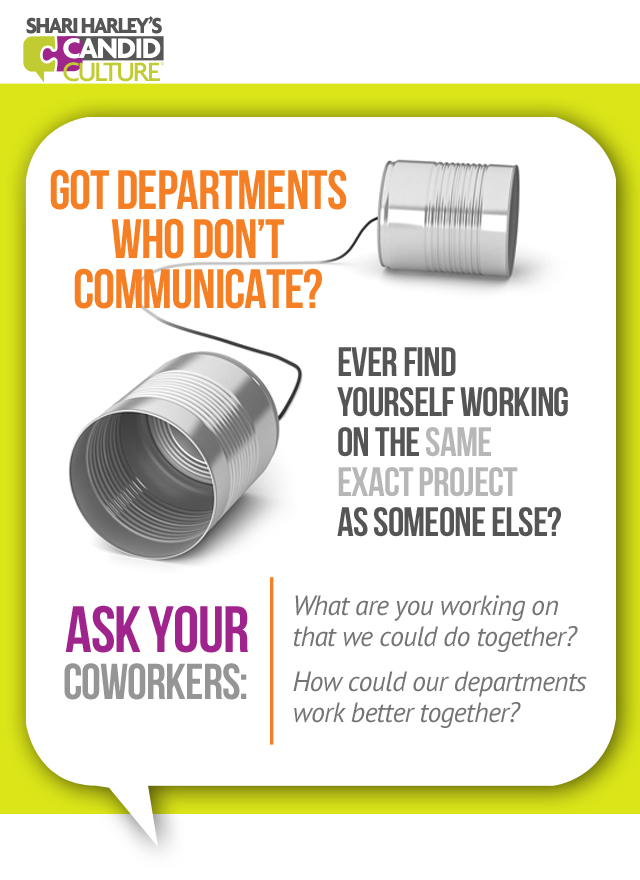
As crazy as it sounds, this isn’t uncommon. People often know very little about what others across their organization do. Sometimes people on the same team don’t even know what type of work fellow team members are doing. This lack of knowledge can lead to conflict (i.e. get off my turf), wasted resources, and stale ideas. If you know two departments are working to solve similar challenges, sharing ideas is likely to generate better solutions.
Friday is National Swap Ideas Day. This sounds like a cheesy, invented holiday, but we’ve all been frustrated or constrained by a lack of sharing of ideas in our workplaces. So in honor of this invented holiday, here are five ways to find out what others in your organization are doing in the hopes of sharing more ideas and resources.
Workplace Communication Tip #1: This will sound basic, but be sure to let the people and departments impacted by your work know what you’re doing. I.e., if you’re advertising a new product, let the folks in fulfillment know they need to staff up the day the advertisement hits prospects’ and clients’ offices or they may not have enough people to fulfill orders. I’m embarrassed to admit we’ve made this mistake at Candid Culture. Oops.
Workplace Communication Tip #2: Create opportunities for departments who impact each other to communicate on a regular basis. Either literally get teams together quarterly to discuss what they’re working on, or if that’s not feasible, select liaisons from each department to meet regularly and discuss current and upcoming projects.
During the discussions, ask these questions:
- What are you working on?
- What challenges are you having?
- What are you trying to change?
- How can we help you?
- What are you working on that we could do together?
- How could our departments work better together?
Workplace Communication Tip #3: Widen your net and ask people you typically don’t have a lot (or any) contact with for their ideas on something you’re working on. Someone doesn’t necessarily need deep knowledge or expertise to offer a suggestion, they just need to think differently than you do.
Workplace Communication Tip #4: Be open to help, new ideas, and sharing projects. It’s easy to feel threatened and territorial at work, thinking that if someone else can do what you do, that you become extraneous. It’s not easy to find employees who are hardworking, reliable, effective, and low drama. Bring all of those qualities to work, and you have nothing to worry about. So start sharing.
Workplace Communication Tip #5: Keep up whatever idea-sharing practice you start. It’s common to try one of the ideas suggested above and then let the practice lapse when things get busy. Put processes in place to make sharing ideas the normal way that you work.
You likely have enough to do. You don’t need to be working on projects that someone else is working on. And sometimes hearing how a coworker would approach a problem will give you a solution you need. Share ideas. Work together across teams and departments and maybe you’ll end working less.

 You’ve heard countless times that you never get a second chance to make a first impression. So when something not-so-positive happens – a customer is upset, you missed a deadline or made an error – don’t let your boss find out about it from someone else. Manage your professional reputation and get there first to create the first impression of what happened.
You’ve heard countless times that you never get a second chance to make a first impression. So when something not-so-positive happens – a customer is upset, you missed a deadline or made an error – don’t let your boss find out about it from someone else. Manage your professional reputation and get there first to create the first impression of what happened.
Managers don’t like surprises. If your manager is going to get a call about something that isn’t positive, let her know before the call comes in. You will create her perception of the situation, and perceptions are hard to change. Don’t wait for the s*** to hit the fan. Get ahead of the problem by coming forward and giving your manager and other stakeholders a heads up.
 It could sound something like this, “I just had a tough conversation with John in IT. You may get a call. Here’s what happened… I didn’t want you to be surprised.”
It could sound something like this, “I just had a tough conversation with John in IT. You may get a call. Here’s what happened… I didn’t want you to be surprised.”
Or, “I told Brian at Intellitec that we’re raising our prices in the second quarter. He wasn’t happy. You may get a call.”
Or let’s say you’re going to work on a strained relationship. Tell your manager before you take action. It could sound something like this, “I want to work on my relationship with Julie. Our relationship has been strained since we worked together on the software project last year. I’d like to approach her, tell her that I know our relationship is strained, and that I’d like a good working relationship with her. Then I’d like to ask if  she’s willing to have lunch with me, talk about what’s happened, and see if we can start again in a more positive way. What do you think of me doing that? Would you approach the conversation differently? I don’t know how it’s going to go, so I wanted you to know what I’m planning to do, just in case it backfires and you get a call.”
she’s willing to have lunch with me, talk about what’s happened, and see if we can start again in a more positive way. What do you think of me doing that? Would you approach the conversation differently? I don’t know how it’s going to go, so I wanted you to know what I’m planning to do, just in case it backfires and you get a call.”
Manage your professional reputation assertively by taking responsibility for mistakes, working on damaged relationships, and telling your manager before someone else does!

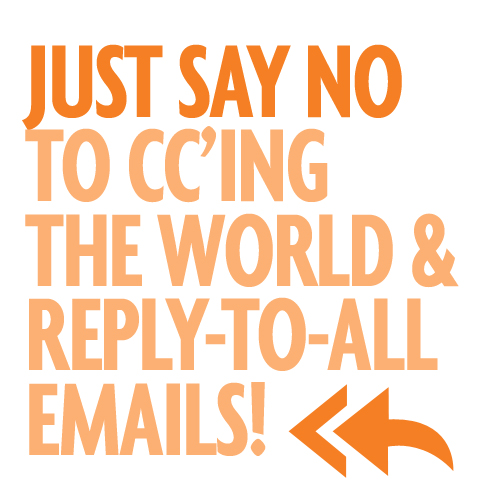
You need something from Suzanne. Suzanne tends to ignore your emails. So in frustration, when sending Suzanne requests, you begin Cc’ing your boss and Suzanne’s boss. This has happened to most of us.
People Cc people who don’t really need to receive communications for a few reasons:
1) Sometimes people really aren’t sure who needs to know the information. So just to be safe, they include others. This can be quite innocent.
2) Sometimes people want others to know what they’re up to (a.k.a. they’re seeking recognition). This is not necessarily bad. It’s important to share what you’re doing for the organization, and cc’ing ancillary people on emails can be a very smart thing to do.
3) Lastly, sometimes people are afraid they won’t get what they need from the email recipient, so they Cc lots of people. This is typically not so innocent.
What should you do when someone Cc’s the world when emailing you, and you fear that it makes you look bad?

I suggest speaking directly with people who Cc others on emails. The conversation could sound something like this, “I noticed that when you email me you have a tendency to Cc other department heads. For example, last week when you asked me for the year-end numbers, you Cc’d my boss, Lisa in Marketing, and Bob in Sales. I was wondering why you’re doing that?”
Then stop talking and listen to what the person says.
Depending on what s/he says, you can respond with something like, “I will always strive to provide you with what you need. If you don’t get what you need from me in a timely way, by all means escalate your request, and go to the people above me. But I’d really appreciate if you’d come to me first and give me a chance to fulfill your request. Would you be willing to do that?”
If the person says something like, “I just think Lisa and Bob need to have this information. I have no other agenda,” you can respond with something like, “I don’t think they need this information, but why don’t we ask them. Would you be comfortable with that? I’ll send them both a message and Cc you, letting them know we talked about this email chain, and ask if they want to continue to receive the messages. How does that sound?”
You never know why someone is doing something, even if you think you know. Ask!

I encourage you to say something versus nothing. If you say nothing you’ll likely make decisions about the person and about your working relationship that may or may not be accurate. If you say nothing, the behavior is bound to continue.
People change their behavior for two reasons, positive and negative consequences. No consequences, no behavior change. No one likes to be ‘called on’ their behavior. Often a conversation like the one above will make the person uncomfortable enough to stop doing what they’re doing.
Reply All Etiquette:
More innocent than Cc’ing the world, but equally annoying, is the reply-to-all email. Someone in your office sends around a joke. Seventy-five people feel compelled to reply to all with their feelings about the joke. When I see things like this, I count how much money in lost wages companies are spending, that is, after I’ve put a pen in my eye.
To prevent reply to all emails, the person who initiates the first email can put in LARGE FONT, “Please reply only to me!”
You can also bcc people on the initial email so the reply’s don’t go to everyone.
It also takes only one person who asks people to stop replying to all, for the email chain to stop. And it’s perfectly appropriate to do this. The email could sound something like, “Going forward, please only reply to Brian, versus replying to all. Thank you!”
When things in the workplace frustrate you, it can be easier to say nothing than to say something. Saying nothing will also help nothing. The frustration is still there. The relationships are still damaged. Gather your courage, and save your office mates a lot of time.
I admit it, it’s one of my pet peeves –calling someone and getting a voicemail message that says the person is traveling and will return to the office on May 24th, when it’s July 1st. I don’t know why this bugs me, it just does. It creates the impression that the person is a little out of it.
While we’re on voicemail pet peeves, why not list a few more:
- voicemail messages that sound like the message was recorded from a busy, street corner
- a voicemail message that promises to return your call as soon as possible, when this person never returns calls
- people who leave LONG messages with a phone number that is said so quickly that even after listening to the message four times, you can’t make out the number
- emails that say the person is out of the office, but don’t say when she is returning
Be careful and aware of the impression you’re creating.
Are your voicemails and emails consistent with how you want to be perceived by others? Do you even know? Call your phone and listen to how your voicemail message sounds. And if you don’t think others will like what they hear, change the message.
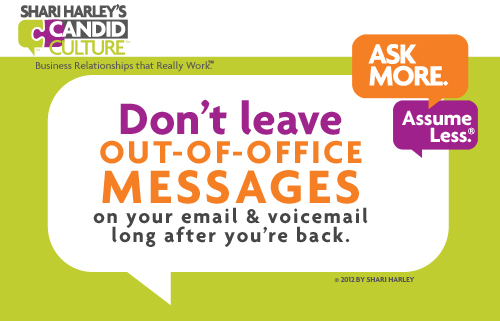






 You’ve heard countless times that you never get a second chance to make a first impression. So when something not-so-positive happens – a customer is upset, you missed a deadline, or made an error – don’t let your boss find out about it from someone else. Manage your professional reputation and get there first to create the first impression of what happened.
You’ve heard countless times that you never get a second chance to make a first impression. So when something not-so-positive happens – a customer is upset, you missed a deadline, or made an error – don’t let your boss find out about it from someone else. Manage your professional reputation and get there first to create the first impression of what happened. It could sound something like this, “I just had a tough conversation with John in IT. You may get a call. Here’s what happened… I didn’t want you to be surprised.”
It could sound something like this, “I just had a tough conversation with John in IT. You may get a call. Here’s what happened… I didn’t want you to be surprised.” she’s willing to have lunch with me, talk about what’s happened, and see if we can start again in a more positive way. What do you think of me doing that? Would you approach the conversation differently? I don’t know how it’s going to go, so I wanted you to know what I’m planning to do, just in case it backfires and you get a call.”
she’s willing to have lunch with me, talk about what’s happened, and see if we can start again in a more positive way. What do you think of me doing that? Would you approach the conversation differently? I don’t know how it’s going to go, so I wanted you to know what I’m planning to do, just in case it backfires and you get a call.”







